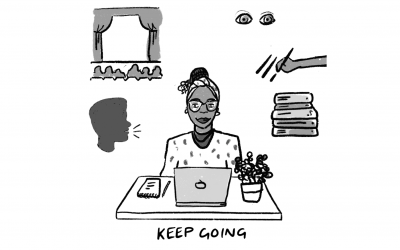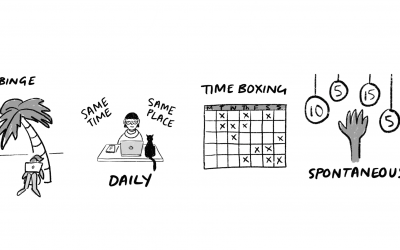You want to feel proud of your writing – of course you do. High standards are admirable. Attention to detail is necessary. But as Voltaire said, “the perfect is the enemy of the good”. When diligence tips over into perfectionist nit picking, guilt and regret can fester and this leads to delay.
Perfectionism has its roots in procrastination – that’s why it’s tough to tackle. Finishing something is scary because often, the next step is to open yourself up to criticism. Sometimes, this fear prevents us from starting anything at all.
Robert Boice, a professor of psychology who studied writers’ block found that people ‘stumble, delay, and panic’ in the face of what he calls a ‘demanding responsibility’.
He writes: “We avoid the threatening task by way of nervous slowing of activity, self-conscious narrowing of scope, even immobilization. Blocking typically occurs when we face public scrutiny (as in a writing block).”
In short, reviewing, revising, refining and polishing feels safe. It doesn’t spook the primitive chimp part of your brain whose job it is to shield you from threat.
It’s got to be…. perfect
Perfectionism wheedles its way into your grey matter so ably because it contains a grain of truth.
Your writing could be better (everyone’s can). Spending another hour, day, week, month revising your work might help (you’re right, it might) but also – it might not.
When you’re a perfectionist it’s easy to convince yourself that refining more or giving it another day is the answer. It’s human nature to give yourself reasons to delay.
But if you want to finish and avoid the anxiety that being a perfectionist can bring, ask yourself these four questions:
1. Does it need to be perfect right now?
At some point, you’ll need to dot the i’s and cross the t’s – but does that need to be today? Yes, you want to submit the very best work you can at some point – but does that need to be right now?
You might not feel proud of that paragraph, that sentence, that page. Frankly, you might feel down-right embarrassed – there might be glaring errors on the page – but does it matter now?
It might – and if so that’s fine – do what you need to do.
But if you’re getting stuck when you don’t need to. You need to move on. On your first draft in particular, it often helps to think of what you’re writing as ‘draft zero’. Something imperfect you can come back to later and improve.
It might be that now is the time your writing needs to be the best it can be – but if it’s not, sometimes, good enough will do.
> Read more: How to stop procrastinating for good: a guide for writers
“Blocking typically occurs when we face public scrutiny.” – Prof. Robert Boice
2. What are my warning signs and triggers?
You’ll never be able to address your perfectionism if you don’t know it’s there. The next time you feel you might be over-perfecting, notice two things:
- What do you do when you over-perfect and how do you feel. Do you re-read, ‘go-over’ work, do more research, do you experience anxiety or feel down? These are your warning signs.
- At what point in the writing process do you do tend to over-perfect? At the start, during the ‘saggy middle’ or in the edit? These are your triggers.
Try to spot a few patterns in your perfectionist behaviour. Jot things down in a notebook if that helps and remember to observe as dispassionately as you can. Now make a simple plan.
- Now you know what warning signs to look out for, how can you avoid getting stuck? This is when asking yourself ‘Does it need to be perfect right now?’ can help.
- Now you know what triggers your perfectionist tendencies, how can you move past these sticking points when they occur again?
3. What evidence do I have that I need to do more?
Perfectionism involves convincing yourself that something’s true when it’s probably not. That the only way you’ll finish your writing is to spend another hour, day or week on it. That you must to find fewer/more/better words before that chapter’s done.
The key is to test the assumptions you reach – don’t just accept them. Think like a scientist and ask for evidence.
- What evidence can give myself that the extra work is essential now?
- Do I really need to revise again? What proof can I give myself that it’s needed?
- Will more time will make the difference? Prove it.
This method isn’t about cutting corners or producing shoddy work. You could be right, you might need to do more. Just don’t just assume you do.
> Read more: Prioritize your writing – make writing matter and make it happen
“The perfect is the enemy of the good.” – Voltaire
4. What small thing can I do to test my assumption?
If you’re still not sure whether your perfectionism is justified or not it’s time to take action. Test your assumptions.
- If you believe you can’t finish writing a paragraph (or a sentence) without spending hours on research – give yourself 15 minutes to write and see how you get on. Can you skip over that tricky bit and come back to it later?
- If you doubt your ability as a writer and want to give up, get some feedback to test that assumption. You could chat to a writer friend, pay for a manuscript feedback, or go on a course to focus on your writing skills. Don’t abandon all your hard work but get support.
The perfect storm
In our coaching experience, perfectionism and procrastination are two of the most damaging things any writer faces because they create negative cycles of self-doubt and low confidence which lead to delay and blocks..
But by asking yourself whether 100% perfection is needed today, by understanding what your perfectionist warning signs and triggers are, and by challenging and testing the assumptions you reach, you can break these negative cycles and most importantly – keep writing and finish to the end.




